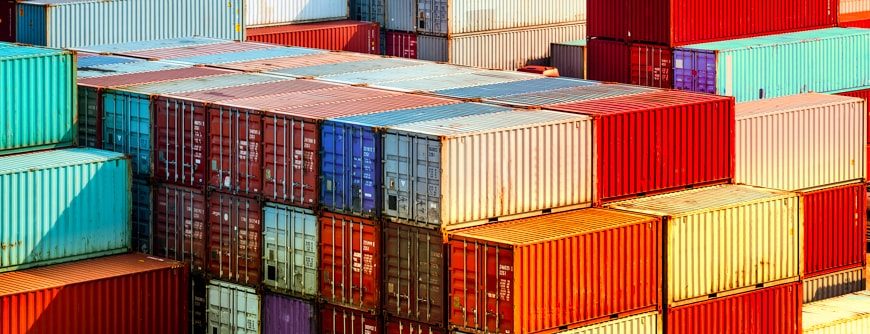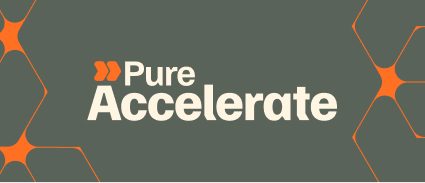Dismiss
Innovation
A platform built for AI
Unified, automated, and ready to turn data into intelligence.
Dismiss
June 16-18, Las Vegas
Pure//Accelerate® 2026
Discover how to unlock the true value of your data.
Dismiss
NVIDIA GTC San Jose 2026
Experience the Everpure difference at GTC
March 16-19 | Booth #935
San Jose McEnery Convention Center
What Are Containers?

What Are Containers?
Containers are standardized units of software that contain all the code and dependencies, including binaries, libraries, and configuration files, needed for an app to run. Containerized software can run reliably from one computing environment to another.
Virtual Machines vs. Containers
Both virtual machines (VM) and containers use virtualization to create isolated environments for running applications. The key difference lies in the granularity of virtualization they provide—VMs virtualize at the operating system (OS)/machine level while containers virtualize at the software level.
Let’s take a closer look at the differences between these two virtualization technologies.
Virtual Machines
A VM virtualizes the entire machine and OS so that it can be hosted on a different machine. To share the resources of the host machine, you’ll need a hypervisor to virtualize the server. Multiple VMs may run on a single hypervisor interfacing with a host machine. VMs can save you money by allowing you to partition a single physical server into multiple machines that can run apps with different dependencies and operating requirements.
While you might save money by not having to purchase new servers, VMs do require a lot of system resources from the host machine. When you have to simulate an entire OS and underlying machine to run a single app through a hypervisor, it becomes clear that further granularity could give you even greater cost savings.

Free Trial of Portworx
No hardware, no setup, no cost—no problem. Try the leading Kubernetes Storage and Data Protection platform according to GigaOm Research.
Containers
Imagine the convenience of running an app in a virtual environment without the hefty resource requirements of a hypervisor. That’s basically what a container allows you to do by encapsulating software into virtual self-contained units.
In a container, you no longer need to virtualize an entire operating system and server with a hypervisor. Instead, you only virtualize the software and hardware dependencies needed for a particular app to run while using the OS kernel of the host machine. Containers allow you to create multiple workloads on a single OS instance. As a result, containers are orders of magnitude less taxing on your physical servers than VMs.
Tradeoffs Between Containers and Virtual Machines
While containers are more agile than VMs, their dependency on the host machine’s OS kernel limits the use of apps with dependencies on other OS environments. VMs are also more isolated and secure in that they are truly independent of the host machine.
You should use containers when:
- Maximizing the number of apps running on a single OS kernel
- Deploying multiple instances of a single app
- Prioritizing compute and storage resources
You should use VMs when:
- Running multiple apps with different OS dependencies on a single server
- Running an app that needs all the resources and functionalities of an OS
- Prioritizing isolation and security
The Benefits of Container Orchestration with Pure Service Orchestrator
While containers abstract away the details of underlying hardware from a software development perspective, inefficiencies in legacy IT infrastructure can still bog down overall performance.
Pure Service Orchestrator™ is a container orchestration tool that effortlessly delivers persistent storage resources to containerized applications. It integrates seamlessly with Kubernetes and other container orchestration tools to provide:
- Automated storage delivery on demand
- Policy-based provisioning
- Elastic scaling across all your arrays including hybrid cloud
- Intelligent container deployment across file and block arrays
- Enterprise-grade resiliency with automated failover and self-healing data access integrity
Pure Service Orchestrator combines elastic scaling, smart provisioning, and transparent recovery to deliver containers as-a-service.
We Also Recommend...
Browse key resources and events

TRADESHOW
Pure//Accelerate® 2026
June 16-18, 2026 | Resorts World Las Vegas
Get ready for the most valuable event you’ll attend this year.
PURE360 DEMOS
Explore, learn, and experience Everpure.
Access on-demand videos and demos to see what Everpure can do.

VIDEO
Watch: The value of an Enterprise Data Cloud
Charlie Giancarlo on why managing data—not storage—is the future. Discover how a unified approach transforms enterprise IT operations.
RESOURCE
Legacy storage can’t power the future
Modern workloads demand AI-ready speed, security, and scale. Is your stack ready?
Personalize for Me